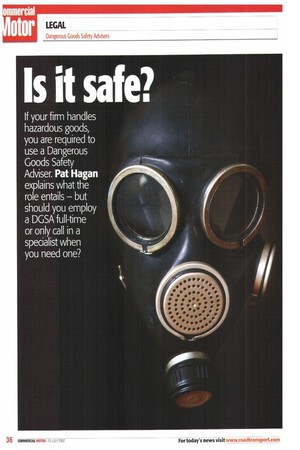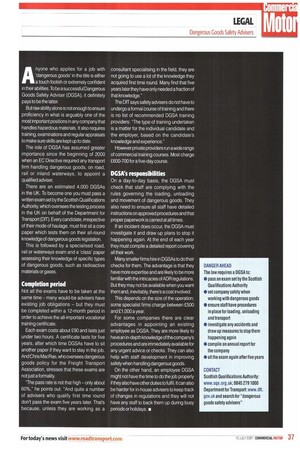s it safe?
Page 36

Page 37

If you've noticed an error in this article please click here to report it so we can fix it.
If your firm handles hazardous goods, you are required to use a Dangerous Goods Safety Adviser. Pat Hagan explains what the role entails — but should you employ a DGSA full-time or only call in a specialist when you need one?
Anyonewho applies for a job with 'dangerous goods' in the title is either a touch foolish or extremely confident in their abilities. To be a successful Dangerous Goods Safety Adviser (DGSA), it definitely pays to be the latter.
But raw ability alone is not enough to ensure proficiency in what is arguably one of the most important positions in any company that handles hazardous materials. It also requires training, examinations and regular appraisals to make sure skills are kept up to date.
The role of DGSA has assumed greater importance since the beginning of 2000 when an EC Directive required any transport firm handling dangerous goods, on road, rail or inland waterways, to appoint a qualified adviser.
There are an estimated 4,000 DGSAs in the UK. To become one you must pass a written exam set by the Scottish Qualifications Authority, which oversees the testing process in the UK on behalf of the Department for Transport (DfT). Every candidate, irrespective of their mode of haulage, must first sit a core paper which tests them on their all-round knowledge of dangerous goods legislation.
This is followed by a specialised road, rail or waterways exam and a 'class' paper assessing their knowledge of specific types of dangerous goods, such as radioactive materials or gases.
Completion period
Not all the exams have to be taken at the same time many would-be advisers have existing job obligations but they must be completed within a 12-month period in order to achieve the all-important vocational training certificate.
Each exam costs about £90 and lasts just under two hours. A certificate lasts for five years, after which time DGSAs have to sit another paper if they want to stay in the job. And Chris MacRae, who oversees dangerous goods policy for the Freight Transport Association, stresses that these exams are not just a formality.
"The pass rate is not that high only about 60%," he points out. "And quite a number of advisers who qualify first time round don't pass the exam five years later. That's because, unless they are working as a consultant specialising in the field, they are not going to use a lot of the knowledge they acquired first time round. Many find that five years later they have only needed a fraction of that knowledge."
The DfT says safety advisers do not have to undergo a formal course of training and there is no list of recommended DGSA training providers: "The type of training undertaken is a matter for the individual candidate and the employer, based on the candidate's knowledge and experience."
However private providers run a wide range of commercial training courses. Most charge £600-700 for a five-day course.
DGSA's responsibilities
On a day-to-day basis, the DGSA must check that staff are complying with the rules governing the loading, unloading and movement of dangerous goods. They also need to ensure all staff have detailed instructions on approved procedures and that proper paperwork is carried at all times.
If an incident does occur, the DGSA must investigate it and draw up plans to stop it happening again. At the end of each year they must compile a detailed report covering all their work Many smaller firms hire in DGSAs to do their checks for them. The advantage is that they have more expertise and are likely to be more familiar with the intricacies of ADR regulations. But they may not be available when you want them and, inevitably, there's a cost involved.
This depends on the size of the operation; some specialist firms charge between £500 and £1,000 a year.
For some companies there are clear advantages in appointing an existing employee as DGSA. They are more likely to have an in-depth knowledge of the company's procedures and are immediately available for any urgent advice or checks. They can also help with staff development in improving safety when handling dangerous goods.
On the other hand, an employee DGSA might not have the time to do the job properly if they also have other duties to fulfil. It can also be harder for in-house advisers to keep track of changes in regulations and they will not have any staff to back them up during busy periods or holidays. •
























































































































































































